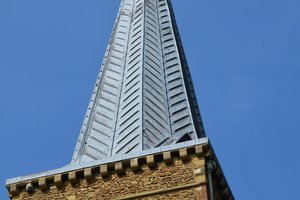Two UK roofing lead firms admit to illegal cartel
Two of the UK’s largest suppliers of rolled lead have admitted to taking part in anti-competitive arrangements and could face fines of more than £11 million.

Rolled lead is an important product for the construction industry, used mainly for roofing. The admission from 2 of the biggest players in the market: Associated Lead Mills Ltd and H.J Enthoven Ltd (trading as BLM British Lead), follows a Competition and Markets Authority (CMA) investigation. A third company, Calder Industrial Materials Ltd, is also under investigation in relation to one of the arrangements and has not made any admissions.
In its original provisional findings, the CMA alleged that Associated Lead Mills, BLM British Lead and Calder Industrial Materials - which together account for about 90% of UK rolled lead supplies - entered into a cartel to share the market amongst themselves through, for example, the allocation of customers.
The CMA has now revised its provisional findings and issued the 3 firms with a ‘supplementary statement of objections’, which outlines its updated allegations. The CMA’s revised provisional view is that there was not a single overall cartel arrangement, but rather 4 individual arrangements that broke competition law.
The CMA’s revised provisional findings indicate that Associated Lead Mills and BLM British Lead entered into arrangements including:
- sharing the market, including by arranging not to target certain customers
- colluding on prices
- exchanging commercially sensitive information on prices
- arranging not to supply a new business that risked disrupting the firms’ existing customer relationships and was also a potential competitor in the market
In the light of the CMA’s updated provisional findings, both Associated Lead Mills and BLM British Lead have now admitted to their parts in these arrangements, which took place between October 2015 and March 2017. The 2 firms have agreed to pay maximum fines totalling more than £11 million, although the exact amount will be determined at the end of the CMA’s investigation, if there is a formal final decision that the law has been broken.
With regard to the third firm, Calder Industrial Materials, the CMA has provisionally found that it became involved, at a later stage, in the arrangement with Associated Lead Mills and BLM British Lead not to supply a new business that risked disrupting the firms’ customer relationships and was a potential competitor in the market. Calder Industrial Materials has made no admission of liability and the CMA’s investigation is continuing. No assumption should be made that Calder Industrial Materials has broken the law.
Notes to editors:
- The investigation is under the Chapter I prohibition the Competition Act 1998 (CA98) and Article 101 of the Treaty on the Functioning of the European Union (TFEU) UK Exit from the EU: Guidance on the functions of the CMA under the Withdrawal Agreement
- The supplementary statement of objections is addressed to the following parties, which the CMA provisionally considers were directly involved in the alleged infringements or are liable as parent companies of the undertakings directly involved: Associated Lead Mills Limited, Royston Sheet Lead Limited (previously Jamestown Metals Limited) and their parent company International Metal Industries Limited (previously International Industrial Metals Limited); H.J. Enthoven Limited (trading as BLM British Lead) and its parent company Eco-Bat Technologies Limited; Calder Industrial Materials Limited and its parent company Calder Group Holdings Limited.
- Associated Lead Mills has agreed to pay a maximum fine of £1,815,614 and BLM British Lead has agreed to pay a maximum fine of £9,516,572 as part of a settlement agreement, if it is found that the law has been broken at the end of the CMA’s investigation.
- The maximum fines for Associated Lead Mills and BLM British Lead have been calculated following the approach set out in CMA’s guidance as to the appropriate amount of a penalty (CMA73). This approach takes into account several factors, including the proportionality of the penalty relative to each company’s individual circumstances. Differences in fines should not be taken to indicate relative culpability.
- A party under investigation by the CMA may enter into a settlement agreement if it is prepared to admit that it has breached competition law and is willing to agree to a streamlined administrative procedure for the remainder of the investigation. In return, the CMA imposes a reduced penalty on the business where settlement would achieve clear efficiencies, resulting in the earlier adoption of any infringement decision and other resource savings. Associated Lead Mills and H.J. Enthoven (trading as BLM British Lead) (and their parent companies) have entered into settlement and admitted that they have infringed the law.
- The CMA continues to investigate the conduct of Calder Industrial Materials, which is not a party to the settlement announced today. No conclusion should be drawn at this stage that Calder Industrial Materials has infringed competition law. Calder Industrial Materials will now have an opportunity to respond to the allegations.
- The CMA will consider any representations it receives before any decision is taken as to whether competition law has in fact been infringed.
- Further detail of the CMA’s procedures in Competition Act 1998 cases is available in CMA’s procedures in Competition Act 1998 cases.
- Anyone who has information about a cartel is encouraged to call the CMA cartels hotline on 020 3738 6888 or email cartelshotline@cma.gov.uk.
- More information on this investigation can be found on the roofing materials investigation case page.
Media enquiries should be directed to the CMA’s press team: press@cma.gov.uk, or 020 3738 6460.